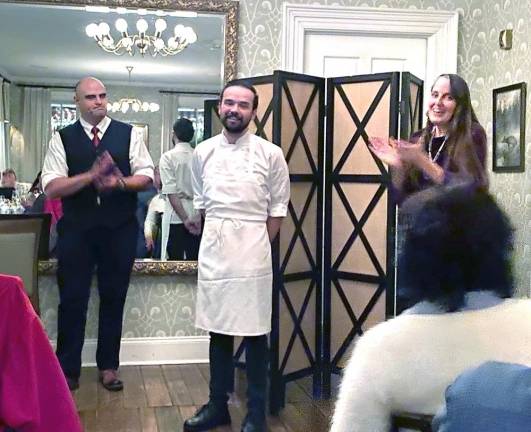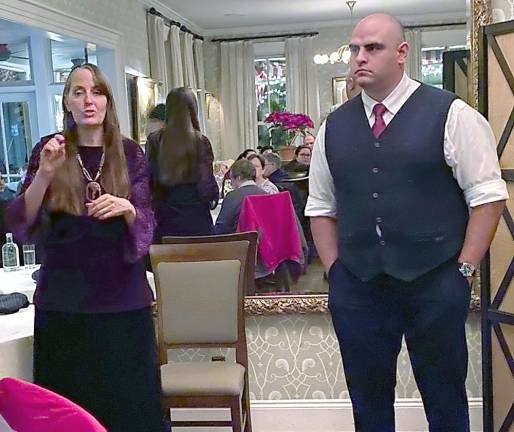The Fauchère’s indigenous dinner: How do you say 'fabulous' in Ojibwe? 'Maamakaadendagwad'
Milford. The Hotel Fauchère’s new chef de cuisine, Bryce Stevenson, a native of the Red Cliff Ojibwe reservation in northern Wisconsin, and special guests Professor Margaret Noodin and Michael Zimmerman Jr. turned the evening of Jan. 3 into a cultural immersion experience.


“Maamakaadendagwad!”
That’s what you would say if you were at the incredible indigenous foods dinner held in the Delmonico Room at the Hotel Fauchère on Jan. 3.
The Delmonico Room was gleaming in white tablecloths and napkins arranged in various configurations to accommodate the 50 diners who were excited about this special culinary event. The atmosphere was warm, welcoming, and anticipatory.
The evening featured a gourmet seven-course tasting dinner by the Fauchère’s new chef de cuisine, Bryce Stevenson, a native of the Red Cliff Ojibwe reservation in northern Wisconsin. The special guests, Professor Margaret Noodin and Michael Zimmerman Jr., were both Stevenson's teachers.
Noodin, who is also Ojibwe, is the director of the Electa Quinney Institute for American Indian Education at University of Wisconsin-Milwaukee and the author of several books about the Ojibwe language. Michael Zimmerman Jr., who is Potawatomi, one of the variations of the Anishinaabe nation, teaches all three dialects of its languages – Ojibwe, Odawa, and Potawatomi– at Milwaukee’s Indian Community School.
There is a movement trending now to learn indigenous languages as well as a growing food sovereignty movement led by native American chefs to reintroduce indigenous dishes and ingredients. The Fauchère is at the forefront of embracing this trend.
Noodin and Zimmerman talked engagingly about each of the dishes on the menu. They also provided information about music, poetry, and other aspects of Ojibwe culture. The audience was delighted and interacted with them as Noodin taught an Ojibwe song ("Hello"), and Zimmerman taught some snippets of the Ojibwe language. It wasn’t at all like a lecture, but rather like being in a good friend’s living room sharing fun facts.
The presentation of each of the courses was beautifully crafted. It was, as they say in Ojibwe, wawiinge (well, carefully done). There was a smoked whitefish, two exotic vegetable dishes, cedar smoked rabbit, charred venison, and a refreshing sweetgrass soda as a palate cleanser before the sweet fry bread dessert with butternut squash, maple, and blackberries.
People raved about how delicious (minopagwad) the food was.
“I think we should get to vote on which of the courses should go on the Fauchère’s permanent menu," said Jeff Rosalsky.
Gail Shuttleworth chimed in with, “I’m looking forward to more dinners like this.”
John Berendt, author of "Midnight in the Garden of Good and Evil" and a frequent visitor to Milford, remarked, “The meal was a delicious taste of Americana.”
People were delighted to explore the cultural aspects of the evening. Angelique Barker brought a large group of friends from Hemlock Farms and Milford.
“We like to keep an open mind about other cultures," she said.
Sean Strub, owner of the Fauchère, pointed out that a lot of people at the dinner had an opportunity to meet new friends, since they combined parties of two with others at the same table
Noodin put it perfectly when she said, “Thanks to everyone for coming – to be open to another culture, and for taking the time to step into our world.”
Then, she taught everyone how to say “thank you” (miigwech) to Stevenson, who came into the Delmonico Room and greeted a very happy group of diners.
Resources to learn more
For more information about the Ojibwe Nation and American Indians/native Americans (both terms are correct in various parts of the country), here are some resources:
Ojibwe.net: Songs and poems, very authentic
The Ojibwe People’s Dictionary at ojibwe.lib.umn.edu: An illustrated, talking dictionary, with photographs old and new
National Congress of American Indians at ncai.org: The National Congress of American Indians, founded in 1944, is the oldest, largest and most representative American Indian and Alaska Native organization serving the broad interests of tribal governments and communities.
Hear Professor Margaret Noodin teach an Ojibwe song at the Fauchère.